Background
José Bonifácio de Andrada was born on June 13, 1763, in the Brazilian seaport of Santos.


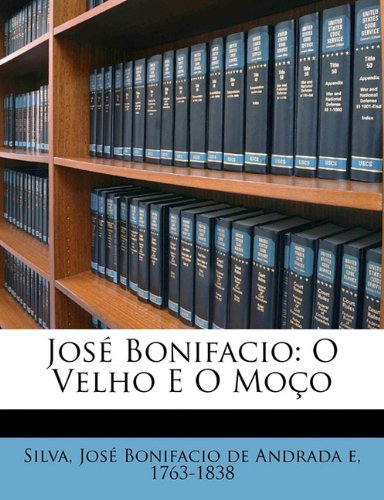
(This is a reproduction of a book published before 1923. T...)
This is a reproduction of a book published before 1923. This book may have occasional imperfections such as missing or blurred pages, poor pictures, errant marks, etc. that were either part of the original artifact, or were introduced by the scanning process. We believe this work is culturally important, and despite the imperfections, have elected to bring it back into print as part of our continuing commitment to the preservation of printed works worldwide. We appreciate your understanding of the imperfections in the preservation process, and hope you enjoy this valuable book.
http://www.amazon.com/gp/product/1173156046/?tag=2022091-20
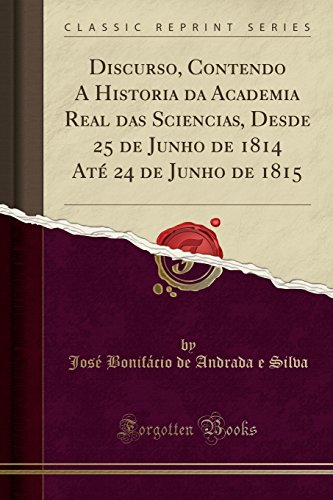
(Excerpt from Discurso, Contendo A Historia da Academia Re...)
Excerpt from Discurso, Contendo A Historia da Academia Real das Sciencias, Desde 25 de Junho de 1814 Até 24 de Junho de 1815 O Sfit. Fr. Francisco de s'. Luiz, dêo a ultima demão ao seu Glossario de Gallieismos &c. Que brevemente sal - xira im presso: Obra por certo de muito estudo e Critica. Lêo se huma Memoria do Siir. Francisco Ribeiro Dosguzmard'es Sobre bum Doeumeuto iuedito do principio do Seculo X pelo qual se prova a ida a Terra Santa que alguns duvidavão do Snr. Conde D. Henrique. Vós a ouvireis nesta Sessão. About the Publisher Forgotten Books publishes hundreds of thousands of rare and classic books. Find more at www.forgottenbooks.com This book is a reproduction of an important historical work. Forgotten Books uses state-of-the-art technology to digitally reconstruct the work, preserving the original format whilst repairing imperfections present in the aged copy. In rare cases, an imperfection in the original, such as a blemish or missing page, may be replicated in our edition. We do, however, repair the vast majority of imperfections successfully; any imperfections that remain are intentionally left to preserve the state of such historical works.
http://www.amazon.com/gp/product/0332414094/?tag=2022091-20
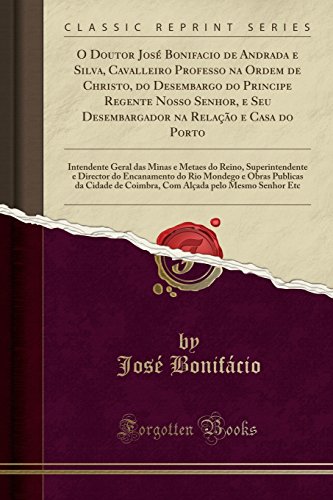
(Excerpt from O Doutor José Bonifacio de Andrada e Silva, ...)
Excerpt from O Doutor José Bonifacio de Andrada e Silva, Cavalleiro Professo na Ordem de Christo, do Desembargo do Principe Regente Nosso Senhor, e Seu Desembargador na Relação e Casa do Porto: Intendente Geral das Minas e Metaes do Reino, Superintendente e Director do Encanamento do Rio Mondego e Obras Publicas da Cidade de Coimbra, Com Alçada pelo Mesmo Senhor Etc S Marachõ'es e Diques ou, são appartar a corrente da agua para a repercutirem seja para dentro do alveo ou para fóra delle o quese pratica nas,.vage'ns e quebra das ou são Interney 'e acompanhão então as margens do alveo sendo parallelos a corrente,, para que esta se não dilate e espraie irregularmente formando par ccis e cascalheiras. O Rio Mondego desde. A Lapa dos Esteíar até aonde desemboca a valla de 17vp deve progressivamente ser; marachoado com maracbões lateraes seguidos em linha continua ou interrompida cavalgando então huns aos outros e deixando bocas. Desde o sitio das diaz até ao Rio Trirzfenão devem estes ser contínuos mas inter rompidos nos lugarescompetentes, deixando bocas in - I versas ao curso das aguas,.as quaes *serão alteadas em, couraça na altura perpendicular de quatro palmas e, meio, e porém deve ter o corpo dos marachões nove, palmos de altura sobre _o nível das aguas de Verão: a largura destas bocas ou sangradoiros será de huma 'braça. Até bra'ça e meia., e as pontas dos marachões que cavala gão huns aos outros, serão de duas_e meia até. Tres braças _e irão abaixando até ao nivel _da banqueta ou margem de segurança o corpo total porém de trinta até cincoenta braças e mais segundo as circunstancias lºu, caes o ponto maisóalto dascouraças deverá ser na linha. Da maior altura commum aa - mbos - os marachões. About the Publisher Forgotten Books publishes hundreds of thousands of rare and classic books. Find more at www.forgottenbooks.com This book is a reproduction of an important historical work. Forgotten Books uses state-of-the-art technology to digitally reconstruct the work, preserving the original format whilst repairing imperfections present in the aged copy. In rare cases, an imperfection in the original, such as a blemish or missing page, may be replicated in our edition. We do, however, repair the vast majority of imperfections successfully; any imperfections that remain are intentionally left to preserve the state of such historical works.
http://www.amazon.com/gp/product/0332409430/?tag=2022091-20
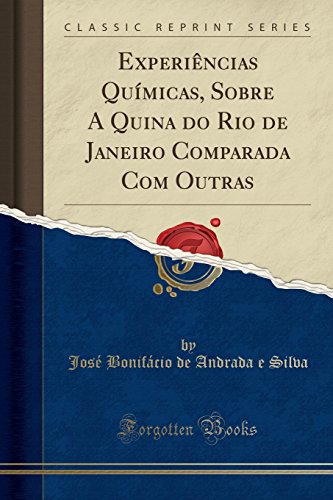
(Excerpt from Experiências Químicas, Sobre A Quina do Rio ...)
Excerpt from Experiências Químicas, Sobre A Quina do Rio de Janeiro Comparada Com Outras Laboratorio entre varias Cascas amargas que para alí tinhão. Sido remettidas) huma, com otitulo de ºpina alaranjada, que havia tradição de ter vindo de Pibaubz', tambem nos ser vimos della com o mesmo intuito. About the Publisher Forgotten Books publishes hundreds of thousands of rare and classic books. Find more at www.forgottenbooks.com This book is a reproduction of an important historical work. Forgotten Books uses state-of-the-art technology to digitally reconstruct the work, preserving the original format whilst repairing imperfections present in the aged copy. In rare cases, an imperfection in the original, such as a blemish or missing page, may be replicated in our edition. We do, however, repair the vast majority of imperfections successfully; any imperfections that remain are intentionally left to preserve the state of such historical works.
http://www.amazon.com/gp/product/0332414396/?tag=2022091-20
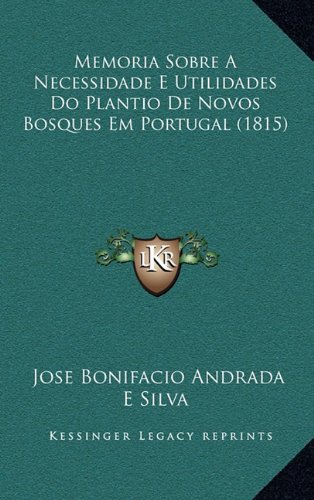
(This scarce antiquarian book is a facsimile reprint of th...)
This scarce antiquarian book is a facsimile reprint of the original. Due to its age, it may contain imperfections such as marks, notations, marginalia and flawed pages. Because we believe this work is culturally important, we have made it available as part of our commitment for protecting, preserving, and promoting the world's literature in affordable, high quality, modern editions that are true to the original work.
http://www.amazon.com/gp/product/1168073596/?tag=2022091-20

("Discursos Parlamentares", do deputado e senador José Bon...)
"Discursos Parlamentares", do deputado e senador José Bonifácio de Andrada e Silva (1827-1886) saiu em 1880 e tem apresentação de Marco Antonio Villa. Sobrinho-neto do Patriarca da Independência, José Bonifácio de Andrada e Silva foi o maior orador político do período. A publicação original reunia 34 discursos, proferidos na Câmara dos Deputados entre 1861 e 1868, além de um pronunciamento de 1879. Para esta edição, foi incluído um discurso de 1886, importante por seu caráter abolicionista. "(...) É um rico retrato da vida política paulista e brasileira, feito por um dos políticos mais destacados do período, que foi professor da Faculdade de Direito do Largo de São Francisco, onde teve como alunos Joaquim Nabuco e Rui Barbosa, (...)", comenta Marco Antonio Villa.
http://www.amazon.com/gp/product/8570605641/?tag=2022091-20

( This work has been selected by scholars as being cultur...)
This work has been selected by scholars as being culturally important, and is part of the knowledge base of civilization as we know it. This work was reproduced from the original artifact, and remains as true to the original work as possible. Therefore, you will see the original copyright references, library stamps (as most of these works have been housed in our most important libraries around the world), and other notations in the work. This work is in the public domain in the United States of America, and possibly other nations. Within the United States, you may freely copy and distribute this work, as no entity (individual or corporate) has a copyright on the body of the work. As a reproduction of a historical artifact, this work may contain missing or blurred pages, poor pictures, errant marks, etc. Scholars believe, and we concur, that this work is important enough to be preserved, reproduced, and made generally available to the public. We appreciate your support of the preservation process, and thank you for being an important part of keeping this knowledge alive and relevant.
http://www.amazon.com/gp/product/1372458743/?tag=2022091-20
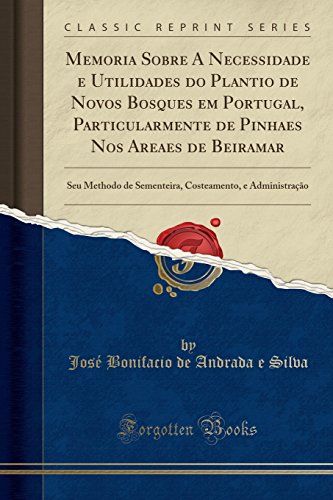
(Excerpt from Memoria Sobre A Necessidade e Utilidades do ...)
Excerpt from Memoria Sobre A Necessidade e Utilidades do Plantio de Novos Bosques em Portugal, Particularmente de Pinhaes Nos Areaes de Beiramar: Seu Methodo de Sementeira, Costeamento, e Administração Monchique, e outras podem Crear humas; e os vàlle; e coâtas 'da Estremadura alemtejo e Algarve as outras da Africa e India e da Amenca meridional. About the Publisher Forgotten Books publishes hundreds of thousands of rare and classic books. Find more at www.forgottenbooks.com This book is a reproduction of an important historical work. Forgotten Books uses state-of-the-art technology to digitally reconstruct the work, preserving the original format whilst repairing imperfections present in the aged copy. In rare cases, an imperfection in the original, such as a blemish or missing page, may be replicated in our edition. We do, however, repair the vast majority of imperfections successfully; any imperfections that remain are intentionally left to preserve the state of such historical works.
http://www.amazon.com/gp/product/0332393887/?tag=2022091-20
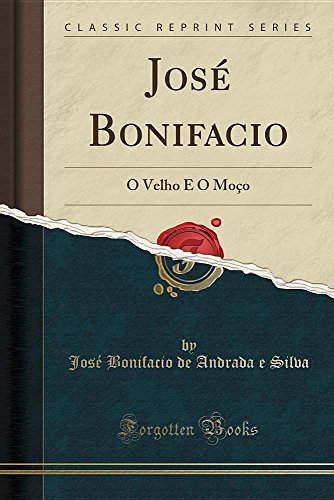
(Excerpt from José Bonifacio: O Velho E O Moço Não faz mu...)
Excerpt from José Bonifacio: O Velho E O Moço Não faz muito tempo, um grande escritor do Rio da Prata escreveu - me, pedindo que lhe indicasse livraria brasileira onde se pudesse prover de eu tores nacionais: nomeava José Bonifácio, o pa triaros da nossa Independência, sábio de repu tação mundial, que ele principalmente queria co nhecer. Corei, comigo mesmo: eu, brasileiro, de uma certa cultura, nada havia lido dêsse grande homem, que tanto interessava ao estrangeiro. About the Publisher Forgotten Books publishes hundreds of thousands of rare and classic books. Find more at www.forgottenbooks.com This book is a reproduction of an important historical work. Forgotten Books uses state-of-the-art technology to digitally reconstruct the work, preserving the original format whilst repairing imperfections present in the aged copy. In rare cases, an imperfection in the original, such as a blemish or missing page, may be replicated in our edition. We do, however, repair the vast majority of imperfections successfully; any imperfections that remain are intentionally left to preserve the state of such historical works.
http://www.amazon.com/gp/product/0428586287/?tag=2022091-20
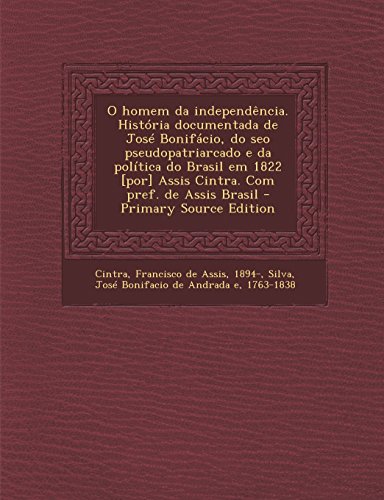
(This is a reproduction of a book published before 1923. T...)
This is a reproduction of a book published before 1923. This book may have occasional imperfections such as missing or blurred pages, poor pictures, errant marks, etc. that were either part of the original artifact, or were introduced by the scanning process. We believe this work is culturally important, and despite the imperfections, have elected to bring it back into print as part of our continuing commitment to the preservation of printed works worldwide. We appreciate your understanding of the imperfections in the preservation process, and hope you enjoy this valuable book.
http://www.amazon.com/gp/product/1295843897/?tag=2022091-20
statesman natural scientist poet
José Bonifácio de Andrada was born on June 13, 1763, in the Brazilian seaport of Santos.
He attended secondary school in nearby Sao Paulo. At the age of 20 he entered the University of Coimbra in Portugal, where he obtained a degree in philosophy in 1787 and in law in 1788. Graduated in Law and Natural Philosophy in Coimbra, he joined the Academia das Ciências de Lisboa (Science Academy of Lisbon).
In 1790 the Portuguese government commissioned Andrada to make a scientific survey of several countries of Europe. This led him to study mining, mineralogy, and chemistry in Paris and mining in Saxony. The survey took 10 years and gained him a reputation as a natural scientist of note. After his return to Portugal in 1800, Andrada was appointed general intendant of mines. He also began a teaching career at Coimbra and held technical, scientific, and administrative positions.
From 1808 to 1810 he fought against the Napoleonic invasion, rising to the rank of lieutenant colonel and a command position. In 1819, after 36 years' absence from his native land, he returned to Brazil. Brazil was in a state of political unrest.
In 1807 the Portuguese monarch, Dom Joao VI, had fled before Napoleon's troops from Portugal to Brazil and had brought large numbers of Portuguese to govern the colony.
In 1815 he elevated Brazil to the status of a kingdom, but dissension between native Brazilians and the Portuguese continued. Andrada arrived in Brazil at a time when Dom Joao was being pressured to return to Portugal, and Brazilians feared that the country's status as a kingdom would be lost.
In 1819, José Bonifácio travelled back to Brazil where he continued to conduct scientific research. A talented man having an unquiet temperament, he was also appointed Minister for Kingdom and Overseas Affairs and became the de facto prime minister.
Dom Joao did return in 1821, and Andrada became an adviser and counselor to the prince regent, left behind. Andrada was instrumental in persuading the prince to declare the independence of Brazil and to assume the title of emperor as Dom Pedro I.
In July 1823 the Emperor dismissed José Bonifácio from his position as counselor, and the three brothers joined the opposition in the constituent assembly. Pedro dissolved the assembly in November, and the Andrada brothers were exiled to France.
In 1823 he was exiled and went to live in Bordeaux where, in 1825, come out his "Poesias Avulsas" (Sundry Poetries). To publish them he used the pseudonym Américo Elísio.
In 1824 the Emperor decreed a constitution which was based on a document José Bonifácio and his brothers had formulated. Andrada returned from exile in 1829 to find once more political unrest in Brazil, with native Brazilians opposing Portuguese-born Brazilians.
The latter supported Dom Pedro I, but the strength of the opposition forced the abdication of the Emperor in 1831. He appointed Andrada as tutor to his son, the 5-year old emperor Dom Pedro II. The Andrada brothers continued to be active in politics, although José Bonifácio, as tutor, was forced into the role of observer rather than participant.
Opposition to him as tutor developed, and in 1833 he was suspended from his position and accused of conspiring and disturbing the public order; he was later acquitted. In December 1836, he contracted tuberculosis.
He died at Paquetá, an island near Rio de Janeiro, on April 6, 1838.
He was one of the most important mentors of Brazilian independence, and his actions were decisive for the success of Emperor Pedro I. He supported public education, was an abolitionist and suggested that a new national capital be created in Brazil's underdeveloped interior (effected over a century later as Brasília). His career as naturalist was marked by the discovery of four new minerals. In 1797 he was elected a foreign member of the Royal Swedish Academy of Sciences.
The mineral andradite is named after him. Among his other discoveries was Petalite, a lithium-containing material, first discovered by Andrada toward the end of the 18th century on a trip to Sweden, and it was in this mineral Swedish chemists first discovered lithium. He also was the first to discover another important lithium-containing mineral spodumene from the same source, an island named Utö near Stockholm.
(Excerpt from O Doutor José Bonifacio de Andrada e Silva, ...)
(Excerpt from Memoria Sobre A Necessidade e Utilidades do ...)
(Excerpt from José Bonifacio: O Velho E O Moço Não faz mu...)
("Discursos Parlamentares", do deputado e senador José Bon...)
(Excerpt from Experiências Químicas, Sobre A Quina do Rio ...)
( This work has been selected by scholars as being cultur...)
(Excerpt from Discurso, Contendo A Historia da Academia Re...)
(This scarce antiquarian book is a facsimile reprint of th...)
(This is a reproduction of a book published before 1923. T...)
(This is a reproduction of a book published before 1923. T...)
(Lang:- por, Pages 362. Reprinted in 2015 with the help of...)
He was a talented man with an unquiet temperament.
